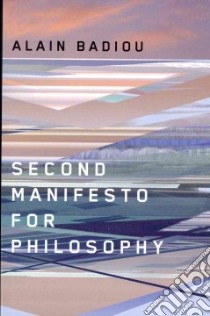- Libreria
- >
- Libri in lingua
- >
- Filosofia
- >
- Filosofia
Second Manifesto for Philosophy - 9780745648620
Un libro in lingua di Alain Badiou Burchill Louise (TRN) edito da Polity Pr, 2011
- € 20.50
- Il prezzo è variabile in funzione del cambio della valuta d’origine
`With his characteristic taste for polemic, economy of expression and relentless cheerfulness, Badiou offers a loud counterblast against contemporary scientism and sophism. Against what he sees as the democratic materialism of the age, Badiou pits a materialist dialectic at the service of the Idea. The Second Manifesto is invigorating reading.' Simon Critchley, Chair of Philosophy, The New School for Social Research
`Badiou's Second Manifesto for Philosophy makes a lucid and compelling demand for philosophy to return from media distraction to its genuine calling. Opposing all moralizing acquiescence in an intolerable global status quo, Badiou reminds us that philosophical thought is, in essence, a quest for universality. The thinker's task is to make sense of truths whose upsurge and impact cuts across space and time. In this sense, far from toying with relativism, the philosopher must be committed to the disciplined work of soldering together separated worlds.' Peter Dews, University of Essex
Twenty years ago, Alain Badiou's first Manifesto for Philosophy rose up against the all-pervasive proclamation of the `end' of philosophy. In lieu of this problematic of the end, he put forward the watchword: `one more step'.
The situation has changed considerably since then. Philosophy was threatened with obliteration at the time, whereas today it finds itself under threat for the diametrically opposed reason: it is endowed with an excessive, artificial existence. `Philosophy' is everywhere. It serves as a trademark for various media pundits. It livens up cafes and health clubs. It has its magazines and its gurus. It is universally called upon, by everything from banks to major state commissions, to pronounce on ethics, law and duty. In essence, `philosophy' has now come to stand for nothing other than its most ancient enemy: conservative ethics.
Badiou's second manifesto therefore seeks to demoralize philosophy and to separate it from all those `philosophies' that are as servile as they are ubiquitous It demonstrates the power of certain eternal truths to illuminate action and, as such to transport philosophy far beyond the figure of `the human' and its `rights'. There well beyond all moralism, in the clear expanse of the idea, life becomes something radically other than survival.
Informazioni bibliografiche
- Titolo del Libro in lingua: Second Manifesto for Philosophy
- Lingua: English
- Autori : Alain Badiou Burchill Louise (TRN)
- Editore: Polity Pr
- Data di Pubblicazione: 08 Febbraio '11
- Genere: PHILOSOPHY
- ISBN-10: 0745648622
- EAN-13: 9780745648620


